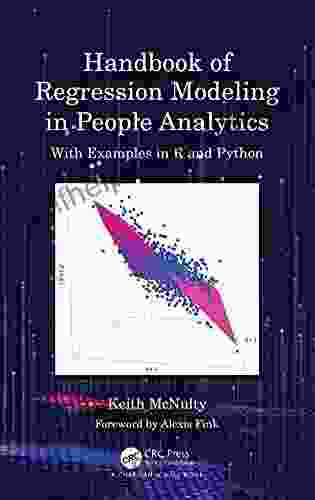The New Era of Networked Science

The world is becoming increasingly interconnected, and this is having a profound impact on the way we live, work, and think. One of the most significant changes is the rise of networked science, an approach that uses networks to understand complex systems.
Networks are mathematical structures that represent the relationships between different elements of a system. They can be used to describe anything from the human brain to the global economy. By studying networks, scientists can gain insights into the behavior of complex systems and how they interact with each other.
5 out of 5
| Language | : | English |
| File size | : | 2751 KB |
| Text-to-Speech | : | Enabled |
| Screen Reader | : | Supported |
| Enhanced typesetting | : | Enabled |
| Word Wise | : | Enabled |
| Print length | : | 261 pages |
The new era of networked science is characterized by three key trends:
- The increasing availability of data. The digital revolution has led to an explosion of data, which is providing scientists with new opportunities to study networks.
- The development of new analytical tools. The development of new computational tools is making it easier to analyze networks and extract meaningful insights from them.
- The growing interdisciplinary collaboration. Networks are often complex and span multiple disciplines. This is leading to a growing interdisciplinary collaboration between scientists from different fields.
The new era of networked science is creating new opportunities for breakthroughs in a wide range of fields. For example, scientists are using networks to:
- Understand the structure and function of the human brain.
- Analyze the spread of disease and develop new strategies for prevention and control.
- Model the global economy and predict financial crises.
- Design new materials and technologies.
- Develop new methods for understanding and managing complex systems.
The new era of networked science is still in its early stages, but it has the potential to revolutionize our understanding of the world around us. By providing new tools for studying complex systems, networked science is helping scientists to make breakthroughs in a wide range of fields.
Challenges and Opportunities
The new era of networked science also presents a number of challenges. One of the biggest challenges is the sheer complexity of networks. Even simple networks can be very difficult to analyze, and this complexity only increases as networks become larger and more interconnected.
Another challenge is the lack of interdisciplinary collaboration. Networks often span multiple disciplines, but scientists from different fields often have different perspectives and approaches. This can make it difficult to develop a common understanding of networks and how to analyze them.
Despite these challenges, the new era of networked science also presents a number of opportunities. One of the biggest opportunities is the potential for breakthroughs in a wide range of fields. By providing new tools for studying complex systems, networked science is helping scientists to make breakthroughs in a wide range of fields.
Another opportunity is the potential for new interdisciplinary collaborations. Networks span multiple disciplines, and this is leading to a growing interdisciplinary collaboration between scientists from different fields. This collaboration can lead to new insights into networks and how to analyze them.
The new era of networked science is a time of both challenges and opportunities. By overcoming the challenges and seizing the opportunities, scientists can make breakthroughs in a wide range of fields and improve our understanding of the world around us.
5 out of 5
| Language | : | English |
| File size | : | 2751 KB |
| Text-to-Speech | : | Enabled |
| Screen Reader | : | Supported |
| Enhanced typesetting | : | Enabled |
| Word Wise | : | Enabled |
| Print length | : | 261 pages |
Do you want to contribute by writing guest posts on this blog?
Please contact us and send us a resume of previous articles that you have written.
 Fiction
Fiction Non Fiction
Non Fiction Romance
Romance Mystery
Mystery Thriller
Thriller SciFi
SciFi Fantasy
Fantasy Horror
Horror Biography
Biography Selfhelp
Selfhelp Business
Business History
History Classics
Classics Poetry
Poetry Childrens
Childrens Young Adult
Young Adult Educational
Educational Cooking
Cooking Travel
Travel Lifestyle
Lifestyle Spirituality
Spirituality Health
Health Fitness
Fitness Technology
Technology Science
Science Arts
Arts Crafts
Crafts DIY
DIY Gardening
Gardening Petcare
Petcare Alan Lightman
Alan Lightman Kindle Edition
Kindle Edition Lisa Fain
Lisa Fain Uta C Merzbach
Uta C Merzbach Deanna Roy
Deanna Roy Charles L Thompson
Charles L Thompson Gabriela Rosa
Gabriela Rosa Stephen Morris
Stephen Morris Gareth Loy
Gareth Loy Robert Warden
Robert Warden Rena Ejiogu
Rena Ejiogu Audrey Coulthurst
Audrey Coulthurst Foster Provost
Foster Provost Michael Grimm
Michael Grimm Gail M Nelson
Gail M Nelson B F Skinner
B F Skinner Family Traditions Publishing
Family Traditions Publishing Conor Sullivan
Conor Sullivan Maria Montessori
Maria Montessori Brandon Sneed
Brandon Sneed Yogi Ramacharaka
Yogi Ramacharaka Claire Nance
Claire Nance Emily Whaley
Emily Whaley Jennifer Love
Jennifer Love Casey Schreiner
Casey Schreiner James Ori
James Ori Aubrey Hargis
Aubrey Hargis Vance Packard
Vance Packard Joe Hutto
Joe Hutto Proprietary Edition Kindle Edition
Proprietary Edition Kindle Edition Bernie Chowdhury
Bernie Chowdhury Cynthia Hand
Cynthia Hand Kimberly Willis
Kimberly Willis Robert T Clemen
Robert T Clemen Carol Ann Rinzler
Carol Ann Rinzler Barbara Oakley Phd
Barbara Oakley Phd Barbara Blitzer
Barbara Blitzer Martins Zaumanis
Martins Zaumanis Madelynne Diness Sheehan
Madelynne Diness Sheehan Jerome D Smalls
Jerome D Smalls Siddhartha Mukherjee
Siddhartha Mukherjee Brett Ortler
Brett Ortler Stewart M Green
Stewart M Green Vivian Sandau
Vivian Sandau Hilary Scarlett
Hilary Scarlett Carolyn Wyman
Carolyn Wyman Nathan Clark
Nathan Clark Shelly Rainforth Collins
Shelly Rainforth Collins Kira Breed Wrisley
Kira Breed Wrisley Tara Sim
Tara Sim Renzo Gracie
Renzo Gracie Seth Kantner
Seth Kantner Richard Ferber
Richard Ferber Spanked Teen
Spanked Teen John Gierach
John Gierach Audrey Grey
Audrey Grey Marie Rutkoski
Marie Rutkoski Staff Of The Harvard Crimson
Staff Of The Harvard Crimson Leigh Pearson
Leigh Pearson Joe Ryder
Joe Ryder Vicki Hoefle
Vicki Hoefle Chloe Lukasiak
Chloe Lukasiak Avery Faigenbaum
Avery Faigenbaum Sanya Richards Ross
Sanya Richards Ross Carl Safina
Carl Safina Arthur Benjamin
Arthur Benjamin Karl Fulves
Karl Fulves Susan F Paterno
Susan F Paterno T Berry Brazelton
T Berry Brazelton David Landis
David Landis Marc Kery
Marc Kery Ryan Sleeper
Ryan Sleeper Jonothan Page
Jonothan Page Philip Clayton
Philip Clayton Jeffrey Freed
Jeffrey Freed Joe Friel
Joe Friel Warren W Wiersbe
Warren W Wiersbe Jermaine Marshall
Jermaine Marshall George J Hademenos
George J Hademenos Sonia Mainstone Cotton
Sonia Mainstone Cotton Izabelle Winter
Izabelle Winter Spike Walker
Spike Walker Richard H Immerman
Richard H Immerman John Gray
John Gray Tiffany Wasson
Tiffany Wasson Eitan Bar
Eitan Bar Linda Fairley
Linda Fairley Suzanne Jurmain
Suzanne Jurmain M Prefontaine
M Prefontaine Nancy Owens Barnes
Nancy Owens Barnes Fred Alan Wolf
Fred Alan Wolf Mercedes Lackey
Mercedes Lackey Audre Lorde
Audre Lorde Dusty Phillips
Dusty Phillips Richard Boergers
Richard Boergers Autumn Carpenter
Autumn Carpenter Pete Whittaker
Pete Whittaker C M Gray
C M Gray Greg B Smith
Greg B Smith Matt Wallaert
Matt Wallaert G R S Mead
G R S Mead Robert Simons
Robert Simons Kristin Fontichiaro
Kristin Fontichiaro Patrisia Gonzales
Patrisia Gonzales Lyn Millner
Lyn Millner Robert E Howard
Robert E Howard Dan Blanchard
Dan Blanchard Lise Eliot
Lise Eliot Jim Holt
Jim Holt Sofia Price
Sofia Price Mark Parman
Mark Parman Larry Dane Brimner
Larry Dane Brimner Richard Miles
Richard Miles Joe Kelsey
Joe Kelsey Fred Mitchell
Fred Mitchell Tomasz Witkowski
Tomasz Witkowski Jessica Seinfeld
Jessica Seinfeld Dean Karnazes
Dean Karnazes Beverly Conyers
Beverly Conyers Susan M Sheridan
Susan M Sheridan Larry Gonick
Larry Gonick Jonathan Cane
Jonathan Cane John S Ahlquist
John S Ahlquist Rehan Haider
Rehan Haider Cat Coluccio
Cat Coluccio Fran Zimniuch
Fran Zimniuch Deborah T Goldberg
Deborah T Goldberg Barry Cunliffe
Barry Cunliffe Lucy Hopping
Lucy Hopping Nancy Friday
Nancy Friday Leonard Mlodinow
Leonard Mlodinow Mike Kim
Mike Kim Kathleen M Eisenhardt
Kathleen M Eisenhardt Wilfrid Jonson
Wilfrid Jonson Mike Eruzione
Mike Eruzione Deborah J Rumsey
Deborah J Rumsey Sam Quek
Sam Quek Hugh Acheson
Hugh Acheson T J Emerson
T J Emerson Kevin Kelly
Kevin Kelly Austa Somvichian Clausen
Austa Somvichian Clausen M D William W Forgey
M D William W Forgey Charles D Garvin
Charles D Garvin Brigid Kemmerer
Brigid Kemmerer Mark Baker
Mark Baker Darren Palmer
Darren Palmer Randi Kreger
Randi Kreger Christopher Burris
Christopher Burris Gaby Melian
Gaby Melian N West Moss
N West Moss David Shoalts
David Shoalts Antoni Porowski
Antoni Porowski Bob Weeks
Bob Weeks Chris Burkard
Chris Burkard Laura A Roser
Laura A Roser Shelley Johnson
Shelley Johnson Lilith Dorsey
Lilith Dorsey Jens Voigt
Jens Voigt James Ladyman
James Ladyman Casey Barber
Casey Barber Steven M Bragg
Steven M Bragg Tim Muehlhoff
Tim Muehlhoff Stephanie Donaldson Pressman
Stephanie Donaldson Pressman Belinda Smith Sullivan
Belinda Smith Sullivan John Hiker
John Hiker Ori Hofmekler
Ori Hofmekler Vb Leghorn
Vb Leghorn Tracey L Moore
Tracey L Moore Debora Rasio
Debora Rasio John Littleford
John Littleford Robert M Bramson
Robert M Bramson Pedro G Ferreira
Pedro G Ferreira Duncan J Watts
Duncan J Watts John Updike
John Updike Justine Kerfoot
Justine Kerfoot Dr Jerisa Berry
Dr Jerisa Berry Brooke Dojny
Brooke Dojny Steve Bisheff
Steve Bisheff Catherine Rodgers
Catherine Rodgers William Woys Weaver
William Woys Weaver Lew Freedman
Lew Freedman Daria Blackwell
Daria Blackwell Picabo Street
Picabo Street William M Kelso
William M Kelso Tara Dixon Engel
Tara Dixon Engel Jeannie Burlowski
Jeannie Burlowski Gillian Bradshaw
Gillian Bradshaw Gary D Wale
Gary D Wale Loren W Christensen
Loren W Christensen Gary Webster
Gary Webster Johny Pitts
Johny Pitts Sara Zarr
Sara Zarr Sarah Boslaugh
Sarah Boslaugh James Garbarino
James Garbarino Scott Mactavish
Scott Mactavish Martin Liebscher
Martin Liebscher Ed Jaworowski
Ed Jaworowski Daffodil Campbell
Daffodil Campbell Ayn Rand
Ayn Rand Peter Levin
Peter Levin Martha Raile Alligood
Martha Raile Alligood Patricia Stacey
Patricia Stacey Martin Rees
Martin Rees Laurie Katz
Laurie Katz Don Orwell
Don Orwell Richard Strozzi Heckler
Richard Strozzi Heckler Ethan Gallogly
Ethan Gallogly Rufus Stephens
Rufus Stephens Johnette Howard
Johnette Howard Pat Mora
Pat Mora Greta Eskridge
Greta Eskridge Ethan Sawyer
Ethan Sawyer Deborah Miller
Deborah Miller Nic Stone
Nic Stone Jayme Adelson Goldstein
Jayme Adelson Goldstein John D Mccann
John D Mccann Katie Cotugno
Katie Cotugno Scott Turansky
Scott Turansky Jacqui Letran
Jacqui Letran Blake Dresden
Blake Dresden Samantha Bongeka Nqoko
Samantha Bongeka Nqoko Kay Harris Kriegsman
Kay Harris Kriegsman Hillary Davis
Hillary Davis Mike Doyle
Mike Doyle Dory Willer
Dory Willer Deanna Pecaski Mclennan
Deanna Pecaski Mclennan Stan Fischler
Stan Fischler Jesus Salcedo
Jesus Salcedo Huw Price
Huw Price Matt Forbeck
Matt Forbeck Elizabeth M Ward
Elizabeth M Ward John Quick
John Quick Don Casey
Don Casey Edward Lee
Edward Lee Manly P Hall
Manly P Hall Gemma Mccrae
Gemma Mccrae Reinhard Bonnke
Reinhard Bonnke David Code
David Code Patrick Holford
Patrick Holford John Swinton
John Swinton William Schoolcraft
William Schoolcraft Brian Christian
Brian Christian Paul Tukey
Paul Tukey Jim Fay
Jim Fay Lore M Dickey
Lore M Dickey Timothy J Jorgensen
Timothy J Jorgensen Larry Miller
Larry Miller George Orwell
George Orwell Athena P Kourtis
Athena P Kourtis Gabrielle Bossis
Gabrielle Bossis Dk Eyewitness
Dk Eyewitness Clive Finlayson
Clive Finlayson Sarah B Bush
Sarah B Bush Rachel Mitchell
Rachel Mitchell Denny Emerson
Denny Emerson Beverly Bell
Beverly Bell Karen Berger
Karen Berger J C Pater
J C Pater Joe Baird
Joe Baird Nick Fragel
Nick Fragel Quick Reads
Quick Reads Jessica Nabongo
Jessica Nabongo Ken Fry
Ken Fry James Feess
James Feess Timo Holmquist
Timo Holmquist Mia Baxter
Mia Baxter Steven Brill
Steven Brill Heather Heying
Heather Heying Mandy Khoshnevisan
Mandy Khoshnevisan Tony Clunn
Tony Clunn Bob Smale
Bob Smale Deborah Falaye
Deborah Falaye Michael Paul
Michael Paul Morgan Murphy
Morgan Murphy Conrad Goeringer
Conrad Goeringer Blake Boles
Blake Boles Sam Pathy
Sam Pathy Lara Lillibridge
Lara Lillibridge Bruno Barnhart
Bruno Barnhart Fred Provenza
Fred Provenza Jerry Scott
Jerry Scott Patricia L Thompson
Patricia L Thompson Robert W Sullivan Iv
Robert W Sullivan Iv Peter Bronski
Peter Bronski Patty Hahne
Patty Hahne Asia Citro
Asia Citro Maureen Connolly
Maureen Connolly Linda Dobson
Linda Dobson Aspen Matis
Aspen Matis Penny Simkin
Penny Simkin S Ali Myers
S Ali Myers Tom Humphries
Tom Humphries Leslie T Chang
Leslie T Chang Lizzie Lane
Lizzie Lane Gerald Paul Clifford
Gerald Paul Clifford Mark Coeckelbergh
Mark Coeckelbergh Eric S Raymond
Eric S Raymond R F Egerton
R F Egerton Ervin Laszlo
Ervin Laszlo Paul Pilkington
Paul Pilkington Asiphile Qulu
Asiphile Qulu Shepherd Mead
Shepherd Mead Adam Parkinson
Adam Parkinson E Paul Zehr
E Paul Zehr E Randolph Richards
E Randolph Richards Ron Dalby
Ron Dalby Avinash K Dixit
Avinash K Dixit Lois Lowry
Lois Lowry Steve Oakes
Steve Oakes David J Miklowitz
David J Miklowitz The Car Crash Detective
The Car Crash Detective Kathy Jackson
Kathy Jackson Audrey Sutherland
Audrey Sutherland Lisa Gache
Lisa Gache Deborah Hughes Hallett
Deborah Hughes Hallett Gabriel Gambetta
Gabriel Gambetta Vasily Mahanenko
Vasily Mahanenko Efrain Galeano
Efrain Galeano Levison Wood
Levison Wood Conrad Anker
Conrad Anker Jeff Szuhay
Jeff Szuhay Kathy Hirsh Pasek
Kathy Hirsh Pasek Ben Sasse
Ben Sasse Fennel Hudson
Fennel Hudson Tarik Unal
Tarik Unal Simon Pridmore
Simon Pridmore Samir Okasha
Samir Okasha John Connor
John Connor Kenneth P Miller
Kenneth P Miller John Austin
John Austin Yang Jwing Ming
Yang Jwing Ming Atlas Kane
Atlas Kane John Sharp
John Sharp Mary Jayne Baker
Mary Jayne Baker Alan Vermilye
Alan Vermilye E W Bullinger
E W Bullinger Todd Mikkelsen
Todd Mikkelsen Thane K Pratt
Thane K Pratt Catherine Belknap
Catherine Belknap Paul Bodine
Paul Bodine Rajeev Lal
Rajeev Lal Tony Nester
Tony Nester Terasa Cooley
Terasa Cooley Hourly History
Hourly History Collins Dictionaries
Collins Dictionaries Linda West
Linda West Mark Gardener
Mark Gardener Drew Harris
Drew Harris Ken Phillips
Ken Phillips Kjell Erik Rudestam
Kjell Erik Rudestam Larry Hart
Larry Hart Andy Mcilree
Andy Mcilree Sandy Hall
Sandy Hall Prayer M Madueke
Prayer M Madueke Jessica S Olson
Jessica S Olson Augustus M Walton
Augustus M Walton Sharon Slater
Sharon Slater Dustin Hansen
Dustin Hansen Aylette Jenness
Aylette Jenness Tom Rea
Tom Rea Moon Travel Guides
Moon Travel Guides Miriam Erick
Miriam Erick Karen Skerrett
Karen Skerrett Harry Bauld
Harry Bauld Laurie Kennedy Malone
Laurie Kennedy Malone Sharon Baranoski
Sharon Baranoski Eric Jones
Eric Jones Darryl Cunningham
Darryl Cunningham Ellyn Sanna
Ellyn Sanna Chris Santella
Chris Santella Ashley Rhodes Courter
Ashley Rhodes Courter Dana Wechsler Linden
Dana Wechsler Linden James Deetz
James Deetz Brent Dykes
Brent Dykes Ben Riggs
Ben Riggs Ernestine Gilbreth Carey
Ernestine Gilbreth Carey Qukids
Qukids Carol Potter
Carol Potter Katie Hoff
Katie Hoff Jeff Vandermeer
Jeff Vandermeer Tori Bortman
Tori Bortman Julia Albu
Julia Albu Miriam Manela
Miriam Manela Simon Askey
Simon Askey Nita Sweeney
Nita Sweeney Ayesha Ratnayake
Ayesha Ratnayake Nfhs
Nfhs Robert Chuckrow
Robert Chuckrow Graham Frankel
Graham Frankel Larry Olmsted
Larry Olmsted Paul Oliver
Paul Oliver Dave Ramsey
Dave Ramsey Janis B Meredith
Janis B Meredith Kevin Bales
Kevin Bales Bubba Watson
Bubba Watson Roy Benaroch Md
Roy Benaroch Md Patrick Hamill
Patrick Hamill R Scott Thornton
R Scott Thornton Leonard Susskind
Leonard Susskind Bradley Stone
Bradley Stone James Nestor
James Nestor Austin Ruse
Austin Ruse Bill Thorness
Bill Thorness Ken Denmead
Ken Denmead Christine Ann Lawson
Christine Ann Lawson Dougald Macdonald
Dougald Macdonald Rick Burgess
Rick Burgess Babatunde Peter
Babatunde Peter Nsca National Strength Conditioning Association
Nsca National Strength Conditioning Association Madeleine Roux
Madeleine Roux Lori Foster
Lori Foster Janet Gurtler
Janet Gurtler Brent Runyon
Brent Runyon Luca Caioli
Luca Caioli Florin Grancea
Florin Grancea Emenwa Global
Emenwa Global Peggy Kaye
Peggy Kaye Augustine Wetta
Augustine Wetta Nina W Brown
Nina W Brown Kaleb Dahlgren
Kaleb Dahlgren Greg Lavern
Greg Lavern Zhi Gang Sha
Zhi Gang Sha Kathy Pike
Kathy Pike Smadar Lavie
Smadar Lavie Rudy Sanchez
Rudy Sanchez David Dalglish
David Dalglish Tracy Deonn
Tracy Deonn Mohamed F El Hewie
Mohamed F El Hewie Robert M Steward
Robert M Steward David Acheson
David Acheson John Skinner
John Skinner Dk
Dk Maya Angelou
Maya Angelou Karen Whitley Bell
Karen Whitley Bell Jessica Nordell
Jessica Nordell Marc D Lewis
Marc D Lewis Brian A Hall
Brian A Hall Temple Bailey
Temple Bailey Steve Colgate
Steve Colgate Cora Seton
Cora Seton Cornelia Pelzer Elwood
Cornelia Pelzer Elwood Beatrice Bruteau
Beatrice Bruteau Kilian Jornet
Kilian Jornet Heather E Schwartz
Heather E Schwartz Esther M Toddler
Esther M Toddler Darja Wagner Ph D
Darja Wagner Ph D Kay Wills Wyma
Kay Wills Wyma J A Baker
J A Baker John Misha Petkevich
John Misha Petkevich Aubre Andrus
Aubre Andrus Judith Z Kallenbach
Judith Z Kallenbach Bernd Brunner
Bernd Brunner Lawrence A Kane
Lawrence A Kane Dima Zales
Dima Zales Colin Towell
Colin Towell Inga Aksamit
Inga Aksamit Jim Collins
Jim Collins Print Replica Kindle Edition
Print Replica Kindle Edition Terry Marsh
Terry Marsh Don J Sharpsteen
Don J Sharpsteen Lindsey Philpott
Lindsey Philpott Colleen Hoover
Colleen Hoover Eunice Pennington
Eunice Pennington Cece Winans
Cece Winans Linda Wong
Linda Wong Mike Mastracci
Mike Mastracci Carly Gelsinger
Carly Gelsinger Steven Rinella
Steven Rinella Sadie Keller
Sadie Keller Dan Morse
Dan Morse Roger Lajoie
Roger Lajoie Liz Carmack
Liz Carmack Babu The Panda
Babu The Panda Mami Wata
Mami Wata Paul Parsons
Paul Parsons Greg Gatz
Greg Gatz Geoffrey Budworth
Geoffrey Budworth Danny Staple
Danny Staple Norman Ollestad
Norman Ollestad Joanne Simon Walters
Joanne Simon Walters Peter Gieler
Peter Gieler Keith Mcnulty
Keith Mcnulty Laura Riley
Laura Riley Lamis Chebbi
Lamis Chebbi Harlan Coben
Harlan Coben
Light bulbAdvertise smarter! Our strategic ad space ensures maximum exposure. Reserve your spot today!

 Kelly BlairUnleashing the Power of Math Through Play: An Exploration of Games for Math...
Kelly BlairUnleashing the Power of Math Through Play: An Exploration of Games for Math...
 Adrian WardHow The Mind Can Defeat Time: A Journey into the Science of Consciousness and...
Adrian WardHow The Mind Can Defeat Time: A Journey into the Science of Consciousness and...
 Michael CrichtonThe Ultimate Handbook for Doulas and Parents: A Comprehensive Guide to Birth...
Michael CrichtonThe Ultimate Handbook for Doulas and Parents: A Comprehensive Guide to Birth... Derek CookFollow ·7.1k
Derek CookFollow ·7.1k Gavin MitchellFollow ·19.5k
Gavin MitchellFollow ·19.5k Oscar WildeFollow ·2.8k
Oscar WildeFollow ·2.8k Osamu DazaiFollow ·3.3k
Osamu DazaiFollow ·3.3k Reginald CoxFollow ·6.2k
Reginald CoxFollow ·6.2k Paul ReedFollow ·5k
Paul ReedFollow ·5k Howard PowellFollow ·4.5k
Howard PowellFollow ·4.5k Juan ButlerFollow ·6.3k
Juan ButlerFollow ·6.3k

 Jett Powell
Jett PowellHow to Choose a Church That's Right for You
Choosing a church...

 Bryan Gray
Bryan GrayThe Unbelievable World of Self-Working Close Up Card...
Imagine having...

 Junot Díaz
Junot DíazUnveiling the Enchanting Old City Laneways and Diavatika:...
Crete, the largest of...

 Jamison Cox
Jamison CoxA Year in the American Wild: Recreating a Feast from...
For one year, I lived off...

 Holden Bell
Holden BellArchaeology of Early American Life: An Exploration of...
The archaeology...

 Rodney Parker
Rodney ParkerRegain Your Fertility By Reversing Insulin Resistance,...
If you're struggling to conceive, you may be...
5 out of 5
| Language | : | English |
| File size | : | 2751 KB |
| Text-to-Speech | : | Enabled |
| Screen Reader | : | Supported |
| Enhanced typesetting | : | Enabled |
| Word Wise | : | Enabled |
| Print length | : | 261 pages |






